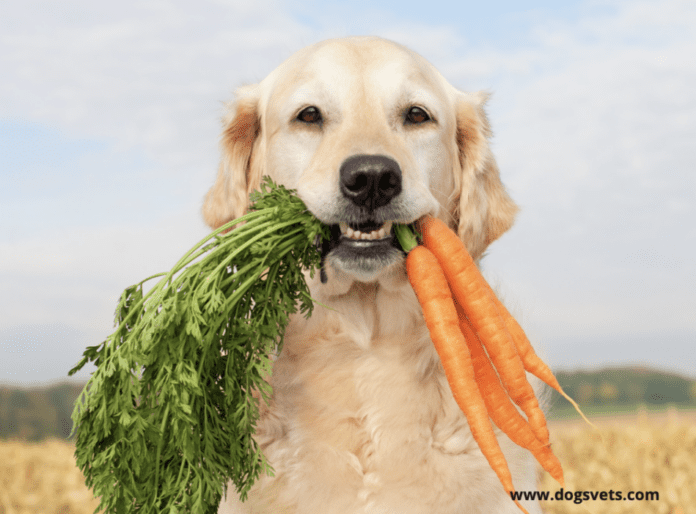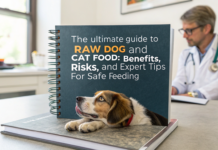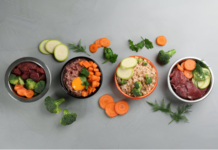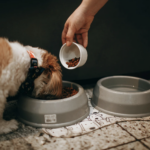Last Updated on August 15, 2022 by Dogs Vets
Vegetables For Dogs
There are many benefits to vegetables for dogs, but there are some dangers as well. Here’s a list of the best vegetables for dogs and the vegetables that should be avoided.
Vegetables should be offered only in small amounts, so dogs do not become overweight.
However, if they are offered large quantities, they may suffer from diarrhea. It is not recommended to give them a lot of vegetables, but a few servings of each type can be enough for dogs.
A List of Good and Bad Veggies For Dogs
Some vegetables are considered healthy for dogs, while others are not.
Regardless of the type, it is important to remember that some vegetables are not suitable for dogs.
Fortunately, there are many vegetable options that your pet can enjoy and that can help keep them healthy. For example, carrots are an excellent source of vitamin C, folic acid, and folate.
Carrots should be washed thoroughly before serving to your dog. When serving them raw, cut them into bite-sized pieces to minimize the risk of choking.
Although some vegetables cause gastrointestinal upset in dogs, you should not stop serving your dog with fresh vegetables.
Your dog will likely enjoy new tastes if they are cooked properly.
Carrots, spinach, and asparagus should be served separately. Likewise, avoid large chunks of these foods. Introduce new vegetables slowly and watch for signs of digestive upset. Once your dog has adjusted to these new foods, increase the amount gradually.
Asparagus
Asparagus is rich in B6, C, E, and K vitamins, thiamin, niacin, and minerals such as copper, potassium, chromium, and selenium. Asparagus is an excellent alternative to chew sticks for dogs. Consider grilling or heating the spears to facilitate swallowing.
Zucchini Zucchini is low in calories, high in fiber, and packed with vitamins and minerals that improve the bones, kidneys, and hearts of canines. Before offering zucchini to your pet, it is important to steam it to soften the skin.
Celery
Can a dog consume celery? The plant is loaded in vitamin A, which improves your pet’s vision, along with vitamins B, C, and K, potassium, and manganese. This low-calorie vegetable is an excellent natural breath freshener for dogs, and many canines enjoy its crunchy texture, but be mindful of the quantity you offer.
Celery is a natural diuretic, so excessive consumption can cause your dog to urinate more often.
Broccoli
Broccoli is an excellent source of fiber, vitamins A, C, E, and K, and it contains virtually no fat. Make sure to cut the stalks into little pieces, as they can easily become caught in the throat of your pet.
Additionally, it should be noted that broccoli florets contain isothiocyanate, a potentially hazardous compound found in all cruciferous vegetables such as cabbage, cauliflower, and kale, which can cause stomach distress in certain dogs.
Beans
Beans such as black, pinto, red kidney, and butter are an excellent source of plant-based protein and minerals such as potassium, magnesium, and folate.
However, they are easily gas-producing and should be eaten in moderation. Green beans are nutritious and can be served raw, steamed, or even canned, so long as they are served simply.
Dogs can safely ingest potatoes so long as they are thoroughly cooked (boiled, roasted, or steamed) and served plain. Never offer raw potatoes to your pet, as they contain solanine, which is poisonous to dogs. Additionally, fried potatoes should be avoided due to their high fat content.
Spinach Dogs may consume spinach, which is an excellent source of iron, magnesium, and vitamins A, C, and E. This leafy green is highly helpful at preventing inflammation, cardiovascular disease, and even cancer because to the presence of all these nutrients.
On the other hand, spinach includes oxalic acid, a substance that prevents calcium absorption in the body and can cause kidney damage, therefore it should be consumed in moderation.
Cabbage
This cruciferous vegetable provides vitamins C, B1, B6, and K, as well as phytonutrients, which are beneficial to your dog’s overall health. However, cabbage should be fed in moderation because it will cause gas in your pet.
Raw cabbage also contains thiocyanate, which, when taken in excessive quantities, can suppress the thyroid gland and cause hypothyroidism in dogs.
Carrots
Carrots are low in calories and high in dietary fiber, vitamins B, E, C, D, and K. These orange vegetables might help keep your dog’s teeth clean when they are consumed uncooked. However, raw carrots can be difficult to digest; therefore, it may be preferable to steam them.
Cauliflower
The omega-3 fatty acids, biotin, manganese, phosphorus, and vitamins B, C, and K found in cauliflower are excellent for boosting the immune system.
Cauliflower, like other cruciferous vegetables on this list, is only safe in tiny doses since it can cause gas in your dog. Cauliflower is difficult to digest when served raw, so it is preferable to serve it mildly cooked (steamed)
Kale
Kale is a superfood for people, and it also provides health advantages for dogs. This dark, green vegetable is excellent for a dog’s vision, immunity, and bones due to its abundance of vitamins A, K, and calcium. Iron, the mineral responsible for healthy red blood cells, is also abundant.
However, kale also includes calcium oxalate, a component of certain bladder stones, and isothiocyanates, which can cause gastrointestinal irritation in dogs and may be toxic in large quantities.
Pumpkin
Vitamins, minerals, and dietary fiber are abundant in pumpkin. Additionally, it is low in calories, delicious, and benefits with digestion. Pumpkin that has been lightly cooked is the simplest for dogs to digest and, when offered in small amounts, can help reduce constipation.
If canned pumpkin does not contain sugar or chemicals, it is also suitable for dogs. Dogs can also be fed pumpkin seeds, but they must be plain (no salt, butter, or oil).
Beets
Beets are an excellent source of vitamin C, folate, manganese, potassium, and fiber. Raw beets pose a major choking threat and can clog the digestive tract of your dog.
However, cooked beets contain oxalate and should be avoided by dogs susceptible to bladder stones. Additionally acidic, these vibrantly colored vegetables might induce gastrointestinal distress, diarrhea, or vomiting in some dogs.
Cucumbers
Cucumbers are abundant in vitamin B1, vitamin C, vitamin K, biotin, copper, potassium, and magnesium. They are extremely low in calories, making them a great treat for overweight dogs. Cucumbers are also composed of 96 percent water, making them an ideal summertime snack.
Peppers
Peppers contain three times as much vitamin C as oranges, which, when paired with beta-carotene, can boost the immune system, protect eyesight, and function as a natural anti-inflammatory.
The finest method for preparing peppers is to steam them to soften their outer skin.
If you choose to serve them uncooked, ensure that they are sliced into little pieces. Don’t forget to double-check before feeding your pet chilli pepper kinds.
Peas
Dogs can eat sugar snap, English, snow, and garden peas. These greens balls are abundant in vitamins A, B, and K, as well as minerals such as iron, magnesium, potassium, and zinc, fiber, protein, and lutein. Serve them in moderation, as excessive consumption might cause diarrhea. As peas contain purines, which can be difficult for the kidneys to handle, they should not be fed to dogs with kidney disease.
Sweet potatoes
Sweet potatoes and yams are extremely high in fiber, as well as vitamins B6 and C. They contain beta-carotene, which benefits skin and vision, similar to carrots. Similar to traditional potatoes, these orange vegetables should be eaten only when cooked (boiled or baked) and without spice.
Brussels sprouts
Brussels sprouts are an excellent source of vitamins C and K, making them excellent for boosting the immune system and promoting bone health. In addition, they contain antioxidants that combat inflammation. Brussels sprouts assist digestion and can help your dog with constipation, but they can also produce flatulence and gas. Ensure that the sprouts are cooked before feeding them to your pet.
Lettuce
Similar to cucumber, lettuce contains a high proportion of water (90 percent), making it an ideal treat for overweight canines. To prevent a choking hazard, make sure to slice the lettuce before feeding it to your pet.
Benefits of vegetables for dogs
Vegetables are packed with vitamins and minerals, and when given to dogs, they can be even more beneficial. When given raw, vegetables are loaded with more nutrients.
Vitamin C is important in boosting your dog’s immune system, while vitamin a promotes healthy skin and eyes. Vitamin b promotes a healthy metabolism and prevents stomach bloating. Vitamin E is good for your dog’s skin and coat, and vitamin k is helpful in blood clotting.
Vegetables are high in fiber, which helps alkalize the body. An alkaline environment is healthier for certain organs, and too much acidity contributes to inflammation, one of the leading causes of chronic diseases.
Vegetables are also good sources of water, which your dog needs to stay hydrated. As a result, your dog’s digestive system will function more efficiently. And a dog’s coat will look better as well.
Vegetables are also high in vitamin C and vitamin K, which is important for bone health. However, be sure to blanch your vegetables before giving them to your dog.
Brussels sprouts, for example, can cause gas, so serve them well cooked. Kale, on the other hand, contains vitamin A and K, as well as dietary fiber and iron.
In addition, beets contain potassium and manganese, which are great for your dog’s digestion.
View this post on Instagram
What veggies are best for dogs?
It’s tempting to throw your dog some salad greens when you’re preparing a meal for yourself, but this might not be a good idea. While vegetables are an excellent addition to a balanced diet, they can be harmful to dogs if you overdo it.
Before introducing any new vegetable to your pup, be sure to check the ingredients. If they look and smell strange, it’s probably not a good idea for your pup to eat them.
Celery is a good choice for your dog’s diet. It’s 95 percent water but contains fiber, vitamins C and K, and folate. It’s also a good source of omega-3 fatty acids, which support mobility.
Celery may be gas-producing, so introduce it gradually. Still, your dog will likely love it. You should also keep in mind that introducing new foods to your dog can be intimidating, so start small and work your way up.
What vegetables are bad for dogs?
Some common fruits and vegetables are toxic to your dog. However, they are perfectly safe for your pup when eaten in moderation.
Avocado and grapes, for example, do not pose a problem. However, if you’re unsure, you should test a few with your dog first. Whether they react is up to you, but generally, tomatoes are safe to feed your dog. So, what vegetables are bad for dogs?
Although vegetables are good for dogs, you should only give them about 10% of their daily diet if you want your pet to be healthy. However, they are not a substitute for other foods in your dog’s diet.
To avoid these potential health risks, cook your veggies in large batches and freeze them. This way, they can be consumed on-the-go. Depending on their taste, you can use a tool like Petcube to identify which vegetables your dog prefers.
Although not all vegetables are harmful to your dog, you should avoid giving them potatoes. They don’t have the same amount of nutrients as other vegetables but still have some benefits. Potatoes are rich in vitamin C and vitamin B6.
Make sure that you prepare them properly, and avoid feeding your dog potato chips. Also, be sure to cook them in moderation as the high fiber content of potatoes can cause an upset stomach in some dogs.
What vegetables can puppies eat?
Veggies are a wonderful addition to a puppy’s diet, and can offer an array of vital vitamins and minerals. However, vegetables should account for only a small portion of a dog’s daily calorie intake.
Vegetables are also hard on the digestive system, so only a small portion should be fed to your pup.
View this post on Instagram
Vegetables are the ideal source of fiber and are rich in antioxidants, enzymes, and phytonutrients. And unlike meat, vegetables contain enzymes not found in other foods.
Puppy-friendly fruits and vegetables are a good source of fibre and vitamins. Some fruits and vegetables can be toxic for puppies, so make sure they are safe for your dog to eat.
For example, green peas are safe to feed puppies, as long as they are uncooked. And for treats, pears and oranges can be tempting, but remove the peel and seeds.
Fresh pears are best, as they contain beta-carotene, a powerful antioxidant that promotes healthy skin and eyesight.
How to feed dogs vegetables
There are some important tips you should know before introducing vegetables to your dog’s diet. While dogs require a protein-rich diet, they have become accustomed to some types of vegetables.
Some vegetables are difficult for dogs’ digestive systems to break down, and they contain toxins and other chemicals that can damage their nervous system or organs. It’s important to limit the amount of vegetables your dog eats to prevent any problems.
Some vegetables can be given to your dog raw, including green beans and celery. But vegetables like potatoes, yams, and yams must be cooked for them to be digested by dogs.
You should cut these vegetables into small pieces, which will help avoid choking hazards. You should also avoid adding spices or butter to your dog’s food, as these will destroy the nutritional value of the vegetables.
Make sure the vegetables are cooked gently, as they are easier for your dog to digest.
Carrots are an excellent source of vitamin A and fibre for dogs. You can also grind the carrot to add to a raw meat meal.
Carrots are low in calories and will not cause gas.
Just remember to make sure your dog doesn’t eat too much celery. It may make them urinate more frequently.
You can also mix grated carrots into your dog’s raw meal. The carrot’s fibre content will help improve your dog’s eyesight, and it will also help keep his teeth clean.
What vegetables can dogs eat daily?
There are several vegetables that dogs can eat daily, but only a few are safe for your pet.
Celery is a great choice for a healthy treat, but you should watch your dog’s intake of it, as it can cause gas and upset the stomach.
You can also add celery to your dog’s daily diet by steaming florets and serving them to them in bite-sized pieces.
Some vegetables can be fed raw to your dog, including spinach and carrots. The main benefit of cooking vegetables for your dog is that the vitamins and minerals will stay intact. In addition, cooked vegetables are easier for your dog to digest.
You can also serve your dog a pureed version of the vegetable. It’s important to wash all vegetables well before feeding them to your dog, though, as it might contain toxic ingredients that can harm your pet.
Broccoli is a great vegetable for dogs. It’s low in calories and contains fiber and phytonutrients that promote your dog’s overall health. Also, red cabbage has a high fiber content and is an excellent source of copper, manganese, and potassium.
Beets are another vegetable that dogs can eat daily. Carrots contain a lot of fiber and don’t give your dog gas.
Can dogs live on vegetables only?
Vegetables are not the most nutritious food for your dog, but some of them are beneficial to his health. For example, apples contain vitamin C and pectin, which is great for the colon and digestive tract. Incorporate applesauce into your dog’s diet.
Carrots are another popular option for your dog. These vegetables contain large amounts of beta-carotene, which is beneficial for the health of your dog’s eyes. Carrots also contain vitamin C and a few other minerals.
In fact, the diet of giant pandas is primarily vegetarian. These animals are carnivores, meaning that they eat prey that are not plants. Their prey can range from tiny creatures to larger animals that the pack has captured.
Usually, the dog will consume meat, bones, and internal organs. In addition, vegetables may be a good source of protein. But if you’re wondering if vegetables are suitable for your dog, read on!
Facts Check
We hope you enjoyed this article… What are your thoughts on Vegetables For Dogs?
Please feel free to share this article!

















